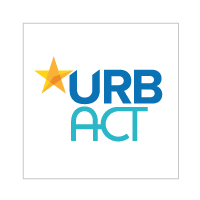Transfer Networks are looking for partners!
Edited on
24 June 2019Some of the 25 Transfer Networks (TN) recently approved are looking for partners!
If you're interested to transfer their practice to your city, fill in their questionnaire and send it back to them before 7 May.

Is my city an eligible candidate?
Before starting to fill in the questionaires from the networks, read first the rules for composing a partnership.
- Number of partners within a TN
Unlike the initial partnership - 3 cities as partners - the final partnership for the phase 2 must be composed of a minimum of 5 up to a maximum of 8 partners.
- Non-city partners
No matter how many partners are in your TN, final partnerships can include a maximum of 2 non-city partners, which must be local agencies.
Local agencies are defined as public or semi-public organisations set up by a city, partially or fully owned by the city authority. They are responsible for the design and implementation of specific policies (economic development, energy supply, health services, transport, etc.).
It is Important to highlight that provincial, regional and national authorities as well as universities and research centers are not considered as eligible partners. Nevertheless, these organizations can be involved with the TN as members of the URBACT Local Group (ULG) that each partner will have to organize at the local level.
- City partners
It is imperative that the majority of partners consist on cities, regardless of the size of its population. Therefore, city partners refer to the public local authority represented by:
- Cities, municipalities and towns;
- Intra-municipalities, tiers of government (like city districts and boroughs), metropolitan authorities and organized agglomerations as long as they are represented by a politico-administrative institution with policy-making and implementation competencies, which are strictly related to the TN area of work.
- Balance between developed and less developed partners
The initial partnership must be balanced with cities from More Developed and Less Developed regions. More especially, the initial partnership shall include at least 1 city from a Less Developed region. Whereas, the final partnerships must imperatively include:
- A minimum of 2 partners from Less Developed regions where the total number of partner is 5;
- A minimum of 3 partners from Less Developed regions where the total number of partner is 6 to 7 partners;
- A minimum of 4 partners from Less Developed regions where the total number of partner is 8 partners.
- The 28 EU Member States
The main beneficiaries (city partners) for Transfer Networks shall be cities from EU 28 Member States, Norway and Switzerland. For each TN, partners shall be from different Member/Partner States meaning there cannot be two partners from the same Member/Partner State in a network. A State can be represented only once per network.
- Number of TN cities can take part
A Good Practice City may not be Lead Partner in more than one project at a time under the same call. However, the labelled Good Practice Cities acting as Lead Partners are allowed to take part in one other Transfer Network as a Transfer City. The labelled Good Practice Cities not acting as Lead Partners may participate in one Transfer Network as a Transfer City.
In brief, in order to be eligible, the Transfer Network final partnership shall:
- Comprise minimum 5 and maximum 8 partners;
- Including the Good Practice City as Lead Partner;
- Include no more than 2 non-city partners as defined above (local agencies);
- Be composed of partners all coming from different Member/partner States.
Which are the networks looking for partners?
| PROJECT NAME | ONE-LINER | INITIAL PARTNERSHIP | LEAD PARTNER CONTACT | ENLARGEMENT SURVEY |
| ALT/BAU | Revitalising decaying historic apartment buildings by connecting owners, investors/users and public authorities | Chemnitz (DE), Rybnik (PL), Vilafranca del Penedès (ES) | Martin Neubert | questionnaire |
| BEE PATH | Building together the story of bees in urban areas | Ljubljana (SI), Bydgoszcz (PL), Cesena (IT) | Luka Sešel | questionnaire |
| BLUACT | "BlueGrowth" is an initiative to support start-ups and sustainable entrepreneurship on the maritime economy | Piraeus (EL), Burgas (BG), Matosinhos (PT) | Elpiniki Katsi | questionnaire |
| CARD4ALL | Providing access to city services and resources while improving citizen participation | Gijon (ES), Suceava (RO), Jurmala (LV) | Laura González Méndez | questionnaire |
| MUSIC SCHOOLS FOR SOCIAL CHANGE | A tool for urban social cohesion through the development of the arts | L'Hospitalet de Llobregat (ES), Municipality of Adelfia (IT), Aarhus (DK) | Núria Sempere | questionnaire |
| REGROW CITY | Working with civil society to reverse decline in small and medium sized towns | Altena (DE), Igoumenitsa (EL), Municipality of Isernia (IT) | Lisa Gudra | questionnaire |
| RUMORLESS CITIES | Enhance diversity by through deconstructing stereotypes and prejudices about immigrants | Amadora (PT), Ioannina (EL), Free and Hanseatic City of Hamburg - District Hamburg-Altona (DE) | Ana Luis | Deadline! 17/05/2018 |
| TECH REVOLUTION (ReBoot) |
Create more and better local jobs through an inspirational hub space and focused business support | Barnsley (UK), Pardubice (CZ), Vilanova i la Geltru (ES) | Paul Tinsley | Deadline! 27/04/2018 |
| WetrEIN | The story of a network that has an obsession for boosting the renewal of the education in our city by means of involving all relevant stakeholders | Viladecans (ES), Tallinn Education Department (EE), Nantes (FR) | Sonia Domínguez |
Deadline! 11/05/2018 |
| Making Spend Matter | Changing procurement. Changing Cities | Preston (UK), Villa Nova de Famalicao (PT), Pamplona (ES) | Tamar Reay | questionnaire |
| Bio-Canteens | Developing sustainable school meals, an integrated agri-food | Mouans-Sartoux (FR), Troyan (BG), Municipality of Rosignano Marittimo (IT) | Thibaud Lalanne | questionnaire |
| C-Change (ACTING) | Arts and Culture Leading Climate Action in Cities | Manchester (UK), Wroclaw (PL), Mantova (IT) | Lisa Lingard | questionnaire |
| com.unity.lab | A local development strategy for neighbourhoods and areas of priority intervention | Lisbon (PT), Bari (IT), Aalborg (DK) | Miguel Brito | questionnaire |
| OpenHouses | A community festival celebrating the city's built heritage and common values | Ujbuda (HU), Gheorgheni (RO), Forli (IT) | Georgina Szakál | Deadline! 11/05/2018 |
| Urban Regeneration Mix | Revitalising historic districts through renovation of buildings and multi-functions | Lodz (PL), Birmingham City Council (UK), Baena (ES) | Martyna Raczkowska-Fijałkowska | Deadline! 10/05/2018 |
Deadline for expressing your interest, unless indicated otherwise: 7 May 2018.
 Submitted by URBACT on
Submitted by URBACT on
